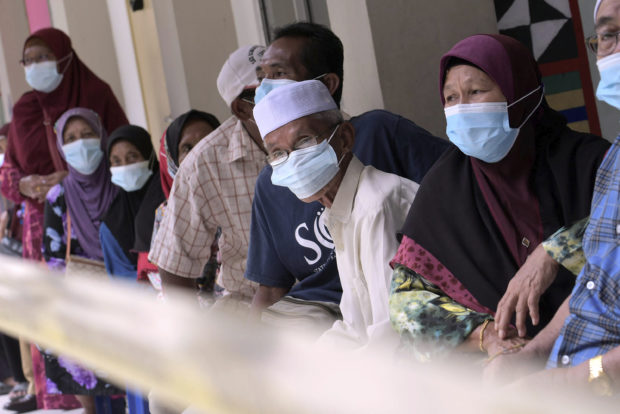Malaysia’s embattled PM wins crucial state polls

Voters wearing face masks to help curb the spread of the coronavirus wait for their turn at a polling station during a state election on the outskirts of Kota Kinabalu, in Malaysia’s Sabah state on Borneo island, Saturday, Sept. 26, 2020. Polls opened Saturday in Malaysia’s eastern Sabah state in a vote seen as a referendum for embattled Prime Minister Muhyiddin Yassin’s 7-month-old unelected government. (AP Photo)
KUALA LUMPUR, Malaysia — Malaysia’s 7-month-old ruling alliance triumphed Saturday in its first electoral test in eastern Sabah state, a major victory for embattled Prime Minister Muhyiddin Yassin amid challenges to his leadership.
Sabah was ruled by the opposition and the state poll was seen as a referendum for Muhyiddin’s unelected government. Analysts said the victory could push Muhyiddin to call for early national elections to bolster his coalition that has a thin two-seat majority in Parliament.
The win could also help Muhyiddin thwart a challenge from opposition leader Anwar Ibrahim, who declared Wednesday he has secured majority support in the national Parliament to oust Muhyiddin and form a new government.
Muhyiddin said in a brief televised speech that his camp has won 38 out of the 73 state seats, enough to form a new state government, and thanked Sabah voters for their trust.
“Muhyiddin has secured enough of a strong performance to strengthen his legitimacy,” said Bridget Welsh, honorary research associate at the University of Nottingham in Malaysia.
Article continues after this advertisementSabah and neighboring Sarawak on Borneo island hold about a quarter of the seats in Parliament and are seen as crucial for political leverage. The two states are rich in oil and timber, but are among the poorest in Malaysia. They have a greater level of autonomy in administration, immigration and judiciary.
Article continues after this advertisementThe leader of Sabah dissolved the state assembly on July 30 to seek early elections and block attempts by Muhyiddin’s ruling alliance to wrest power in Sabah through lawmakers’ defections.
The attempted takeover of Sabah was reminiscent of how Muhyiddin took power in March after defecting from the reformist government to form a new Malay-centric administration.
Muhyiddin’s alliance has since taken control of many states after lawmakers defected. After losing Sabah, the opposition now controls only two of the country’s richest states, Selangor and Penang.
But Muhyiddin has been struggling to maintain support amid infighting in his coalition. His leadership was thrown into further doubt after Anwar claimed to have won majority support, including from lawmakers in Muhyiddin’s camp.
Anwar hasn’t revealed details, as he is waiting to meet with Malaysia’s king, who is in a hospital for treatment. The king has power to appoint a new prime minister or dissolve Parliament for an early general election, which is not due until 2023.
Muhyiddin has said Anwar’s declaration was a mere allegation until he provides evidence.
The Sabah victory “took wind away from Anwar’s sail,” said Oh Ei Sun, a senior fellow at the Singapore Institute of International Affairs.
Muhyiddin’s heavy campaigning in Sabah with pledge for development has worked well in interior seats, Oh said. Billboards of Muhyiddin’s smiling face dubbed “Abah,” or father, are prominent in many constituencies.
Muhyiddin’s allies in his ruling alliance are likely to increase calls for early national polls after the Sabah win. “Situation remains uncertain, with pressures toward an election real,” Welsh said.
His government is propped up by the United Malays National Organization, that lost power in 2018 elections to an alliance that involves Anwar’s party. Muhyiddin’s party is dwarfed by UMNO and that puts him in a weak position.
The Sabah election has been held with enhanced health measures amid rising coronavirus cases in the state in recent weeks.
Hours after voting began, a candidate from Muhyiddin’s alliance announced on social media that he had tested positive for the virus and urged those who have come into close contact with him to go for screening. Malaysia has recorded just over 10,000 cases.
The number of infections is thought to be far higher because many people have not been tested, and studies suggest people can be infected with the virus without feeling sick.
For most people, the new coronavirus causes mild or moderate symptoms, such as fever and cough that clear up in two to three weeks. For some — especially older adults and people with existing health problems — it can cause more severe illness, including pneumonia, and death. The vast majority recover.